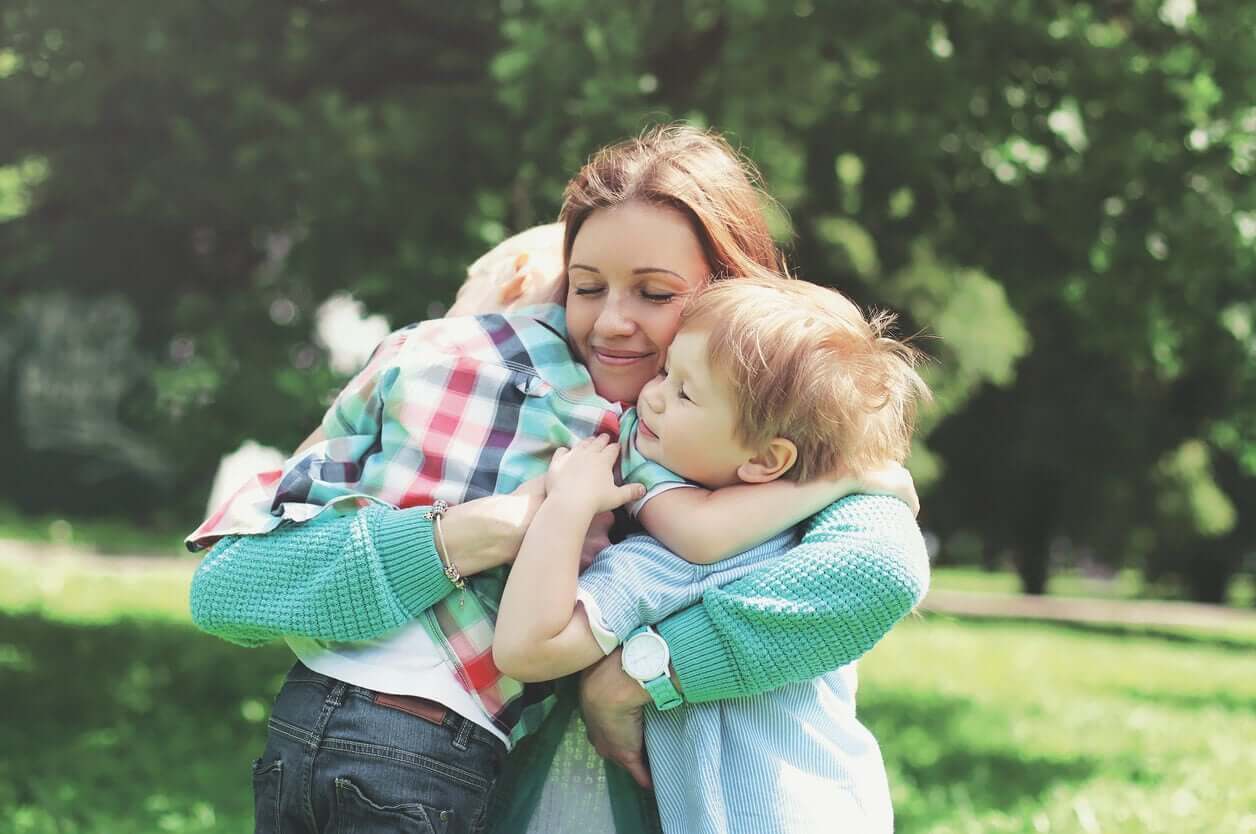How to Help a Baby Adjust to Their Daycare


Written and verified by the psychopedagogue María José Roldán
Changes are never easy for anyone, and for a baby who doesn’t understand what’s happening around them, this can be even more complicated. So, it’s essential that, as a parent, you can help your little one to adjust to their daycare in the best possible way. Be patient, because leaving the comfort zone implies a huge effort for everyone.
Tips to help your baby adjust to their daycare
When faced with new challenges, fear and anxiety are two unavoidable feelings. As adults, we can manage them, and in the end, we manage to cope with the change. But babies don’t have the necessary tools to work out such intense emotions.
At the same time, after a few months of life, the little ones have a fairly limited knowledge of the world. Therefore, going from home to daycare can be their first great life experience and it’s totally natural for them to want to resist it.
You may be interested: At What Age Should a Child Enter Daycare?
Many children experience this transition with great anguish, feeling that their parents are abandoning them and that they’ll never return. This discomfort manifests itself through recurrent crying spells, vomiting, loss of appetite, and even trouble sleeping. However, these are transitory issues that diminish as the little one gets used to the new reality and finds that their parents always return.
Next, we’re going to give you some tips so that you can help your child adjust to their daycare in the best possible way. Take note!
1. First of all, understand them

Although you’re the adult and you see everything as easy, for your baby, this isn’t the case. Make an effort to understand their intense emotions and try to put yourself in their shoes. Imagine that you can’t fend for yourself and that your caregivers leave you in the care of a stranger, in a strange new place that’s full of other strangers.
As you can see, your child’s anguish is more than justified, and therefore, you need to support and accompany them at all times.
2. Prepare them at home
The period of adaptation to the nursery should begin at home. For example, one day, you can go to the child’s daycare so that your baby can see the facilities, meet the people who will be with them, and know that after a while, you both return home calmly and together.
You can also try some games or read stories to help them understand what they’re going to experience. That way, you help them begin to process their emotions.
3. Make the change progressively
The best way to help your child adjust to their daycare is to respect their timing. Therefore, it’s best to make changes progressively: The first day, leave them for just half an hour, the next day an hour, then an hour and a half and so on. Increase the time little by little so that the child can adjust to their daycare gradually.
Perhaps the children’s center will advise you on a different type of adaptation, but depending on the characteristics of your little one, you can reach an agreement so that the plan is better adapted to them.
4. Keep a positive attitude
It’s important that you don’t treat the event as something dramatic or traumatic. Staying positive is the best way to cheer up your little one and help reduce stress or fear.
Your anxiety can cause your child a lot of distress, so try to maintain a calm and motivating attitude at all times.
5. Allow them to take a security object
A security object can be a good ally during the first days of adaptation. Choose their favorite: A stuffed animal, a blanket, a bottle, or any item that provides security and that transmits the confidence and warmth of your home.
6. Accompany them
It’s important that your child feels accompanied all the time so that they can erase from their mind the idea that you’ll never return to take them home.
Therefore, accompany them to the door and always pick them up on time, as any delay can produce a great deal of anguish.
7. Always say goodbye but don’t drag it out

You have to say goodbye to your child always and not disappear as if by magic. Otherwise, you don’t allow them to correctly overcome the situation.
In addition, it’s important that you not prolong the goodbyes too long because you can produce a great deal of separation anxiety in your little one. The farewell should be calm and safe: Give them a kiss, leave with a good attitude, and give the care over to the adult in charge of the class.
Adaptation to daycare involves the whole family
As you’ve seen, it’s not only the baby who has to adapt to this new stage. Put these tips into practice and you’ll see that the process is much easier for everyone.
Be aware all the time that changes are hardly ever easy and use all your empathy to provide love, understanding, and security all the time.
Changes are never easy for anyone, and for a baby who doesn’t understand what’s happening around them, this can be even more complicated. So, it’s essential that, as a parent, you can help your little one to adjust to their daycare in the best possible way. Be patient, because leaving the comfort zone implies a huge effort for everyone.
Tips to help your baby adjust to their daycare
When faced with new challenges, fear and anxiety are two unavoidable feelings. As adults, we can manage them, and in the end, we manage to cope with the change. But babies don’t have the necessary tools to work out such intense emotions.
At the same time, after a few months of life, the little ones have a fairly limited knowledge of the world. Therefore, going from home to daycare can be their first great life experience and it’s totally natural for them to want to resist it.
You may be interested: At What Age Should a Child Enter Daycare?
Many children experience this transition with great anguish, feeling that their parents are abandoning them and that they’ll never return. This discomfort manifests itself through recurrent crying spells, vomiting, loss of appetite, and even trouble sleeping. However, these are transitory issues that diminish as the little one gets used to the new reality and finds that their parents always return.
Next, we’re going to give you some tips so that you can help your child adjust to their daycare in the best possible way. Take note!
1. First of all, understand them

Although you’re the adult and you see everything as easy, for your baby, this isn’t the case. Make an effort to understand their intense emotions and try to put yourself in their shoes. Imagine that you can’t fend for yourself and that your caregivers leave you in the care of a stranger, in a strange new place that’s full of other strangers.
As you can see, your child’s anguish is more than justified, and therefore, you need to support and accompany them at all times.
2. Prepare them at home
The period of adaptation to the nursery should begin at home. For example, one day, you can go to the child’s daycare so that your baby can see the facilities, meet the people who will be with them, and know that after a while, you both return home calmly and together.
You can also try some games or read stories to help them understand what they’re going to experience. That way, you help them begin to process their emotions.
3. Make the change progressively
The best way to help your child adjust to their daycare is to respect their timing. Therefore, it’s best to make changes progressively: The first day, leave them for just half an hour, the next day an hour, then an hour and a half and so on. Increase the time little by little so that the child can adjust to their daycare gradually.
Perhaps the children’s center will advise you on a different type of adaptation, but depending on the characteristics of your little one, you can reach an agreement so that the plan is better adapted to them.
4. Keep a positive attitude
It’s important that you don’t treat the event as something dramatic or traumatic. Staying positive is the best way to cheer up your little one and help reduce stress or fear.
Your anxiety can cause your child a lot of distress, so try to maintain a calm and motivating attitude at all times.
5. Allow them to take a security object
A security object can be a good ally during the first days of adaptation. Choose their favorite: A stuffed animal, a blanket, a bottle, or any item that provides security and that transmits the confidence and warmth of your home.
6. Accompany them
It’s important that your child feels accompanied all the time so that they can erase from their mind the idea that you’ll never return to take them home.
Therefore, accompany them to the door and always pick them up on time, as any delay can produce a great deal of anguish.
7. Always say goodbye but don’t drag it out

You have to say goodbye to your child always and not disappear as if by magic. Otherwise, you don’t allow them to correctly overcome the situation.
In addition, it’s important that you not prolong the goodbyes too long because you can produce a great deal of separation anxiety in your little one. The farewell should be calm and safe: Give them a kiss, leave with a good attitude, and give the care over to the adult in charge of the class.
Adaptation to daycare involves the whole family
As you’ve seen, it’s not only the baby who has to adapt to this new stage. Put these tips into practice and you’ll see that the process is much easier for everyone.
Be aware all the time that changes are hardly ever easy and use all your empathy to provide love, understanding, and security all the time.
All cited sources were thoroughly reviewed by our team to ensure their quality, reliability, currency, and validity. The bibliography of this article was considered reliable and of academic or scientific accuracy.
- BERNARDO PACHECO P.1, TAMARA VENTURA W. (2009). Trastorno de ansiedad por separación. Revista mexicana de investigación educativa, 80 (2): 109-119. Recuperado en 17 de septiembre de 2021, de https://www.scielo.cl/scielo.php?script=sci_arttext&pid=S0370-41062009000200002
- Perez Toldi, R. ANTICIPAR Y COMUNICAR CON BEBÉS Y NIÑOS PEQUEÑOS. Teta à porter. [Internet]. Disponible en: https://tetaaporter.com/2018/02/15/anticipar-comunicar-bebes-ninos-pequenos/
This text is provided for informational purposes only and does not replace consultation with a professional. If in doubt, consult your specialist.








